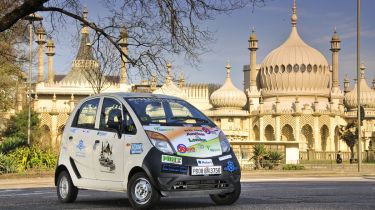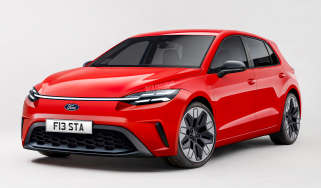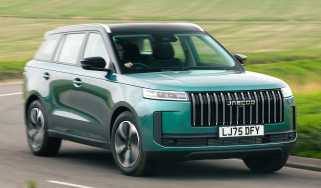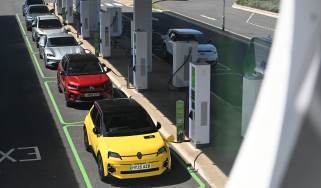Tata Nano
The world's cheapest car has finally reached the UK and we got behind the wheel in an exclusive drive.
To judge the Nano against other cars seems inappropriate – its incredible price has dictated some fundamental compromises in terms of performance, design and dynamics. But while it doesn’t offer a conventional drive, the Nano is a thoroughly unconventional car. Despite the global financial situation, the price has been kept low, which means it really will bring radically affordable motoring to the masses, just like the original Model T Ford did 100 years ago. What’s more it’s cheap to run, surprisingly well equipped and is seriously practical too. Tata will have delivered 100,000 examples Nanos by the end of 2010, and the number will only spiral upwards. And with a few modifications, including the addition of ABS, airbags and the like, we can’t wait to try the Europeanised version when it hits UK roads in 2011.
Meet the Model T for the 21st century. The Tata Nano is the people’s car designed to bring affordable motoring to India. And while its mix of sensational value, impressive space and superb efficiency has meant that Tata can’t build its amazing supermini quickly enough, it’s not just India that will benefit from a little Nano technology.
The car is coming to the UK, albeit in slightly modified form. But how it will fair on the UK’s uniquely challenging road network? Auto Express has gained exclusive access to the only Nano in Britain to find out.
The headline statistic is that the Nano is the cheapest new car in the world. Depending on where you live in India, a new example will set you back around 115,000lakh, or just over £1,500 at today’s exchange rate. Its nearest competitor in India is the Maruti M800, which is effectively a rebadged second generation Suzuki Alto, and costs roughly twice the price.
Used - available now

2024 Nissan
Ariya
12,471 milesAutomaticElectric
Cash £25,490
2021 Lexus
UX 300e
39,392 milesAutomaticElectric
Cash £16,950
2023 Hyundai
i30
23,040 milesManualPetrol1.0L
Cash £14,801
2021 Vauxhall
Mokka
16,283 milesAutomaticPetrol1.2L
Cash £15,795But in the flesh, the first thing that strikes you about the Nano is its unusual proportions. It’s a small car, with a length and width that are roughly the same as an original Mini. But the combination of lofty roofline and tiny 12-inch wheels at each corner really catch the eye and make even those without an interest in cars stop and stare. Put simply the egg-shaped Nano looks like no other car, particularly in this example’s shade of off-white.
Clamber into the interior and the distinctive exterior begins to make sense. The rather top-heavy appearance liberates lots of headroom for all passengers, while the fact that the engine is located under the boot floor rather than in the nose means that there’s an impressive amount of room inside.
The dash design is basic and functional, but it’s solidly built. Despite being one step up from the entry-level X model, our car featured air conditioning and a Bluetooth-equipped stereo but passengers do have to wind their own windows and lock their own doors. Despite looking like they were stolen from a 1980s bus, the seats are comfortable, adjustable and quite supportive.
In the rear, space is good, with decent legroom across the bench, while passengers have to measure over 6 ft 2 before their heads brush the roof – seriously impressive for a car that takes up so little space on the road.
In order to trim costs, the Nano doesn’t have an opening boot hatch. Instead, the luggage space is accessed by dropping the rear seat back down and loading through the rear doors. To compensate, the light weight doors open to 90-degrees making for easy access.
The lack of a rear hatch is just one of the many money saving details the Nano features. A rear wiper, with its accompanying electronics is too complex, so there isn’t one. Likewise, because the car is limited to 68mph, just three wheel bolts are used to hold each of the 12-inch rims on. Base models come with just one wing mirror and only feature door locks on the driver’s side.
But the most significant cash conscious feature is the tiny powerplant which is hidden beneath the boot floor. The engine has been specially-designed for the Nano and has just two cylinders, displaces 0.6-litres and produces 35bhp. It drives the rear wheels through a four speed gearbox.
It splutters into life with a buzzy thrum which resonates through the cabin. Select first and the Nano moves off with surprising ease – the relative lack of weight offset by the Caterham-rivalling 600kg kerbweight.
The driving position is set quite high, which gives you a good view of the road ahead through the large glazed area.
Thanks to the lack of mass, Tata elected to fit the Nano with more cost effective non-ABS drum brakes all round. And once warmed up, these work adequately to bring you to a safe stop. And, like the stoppers, the steering is unassisted. But once you get used to the extra heft, the helm is pretty direct and the turning circle is as tight as a Smart ForTwo.
The driving experience is unique. The ride is pretty good, with the suspension soaking up potholes well – a quick drive on a rutted gravel carpark confirmed that the Nano is surprisingly adept at soaking up the worst a badly made road can throw at it, perfect for India’s rural road network.
A motorway drive takes a little more nerve. The fourth gear is more of an overdrive ratio, keeping revs and noise down at high speed. In good weather, the Nano easily hits 65mph, which triggers a small yellow warning light on the dash. At 68mph, the limiter kicks in to save the engine. However, this is welcome as the draft from passing lorries is pretty eye-opening as the flyweight Nano rocks around in their wake.
Range also has a bearing on making long distance progress. The Nano manages around 65mpg in mixed driving, but filling the Nano’s front-mounted fuel tank with unleaded happens little and often due to its 15-litre capacity.



